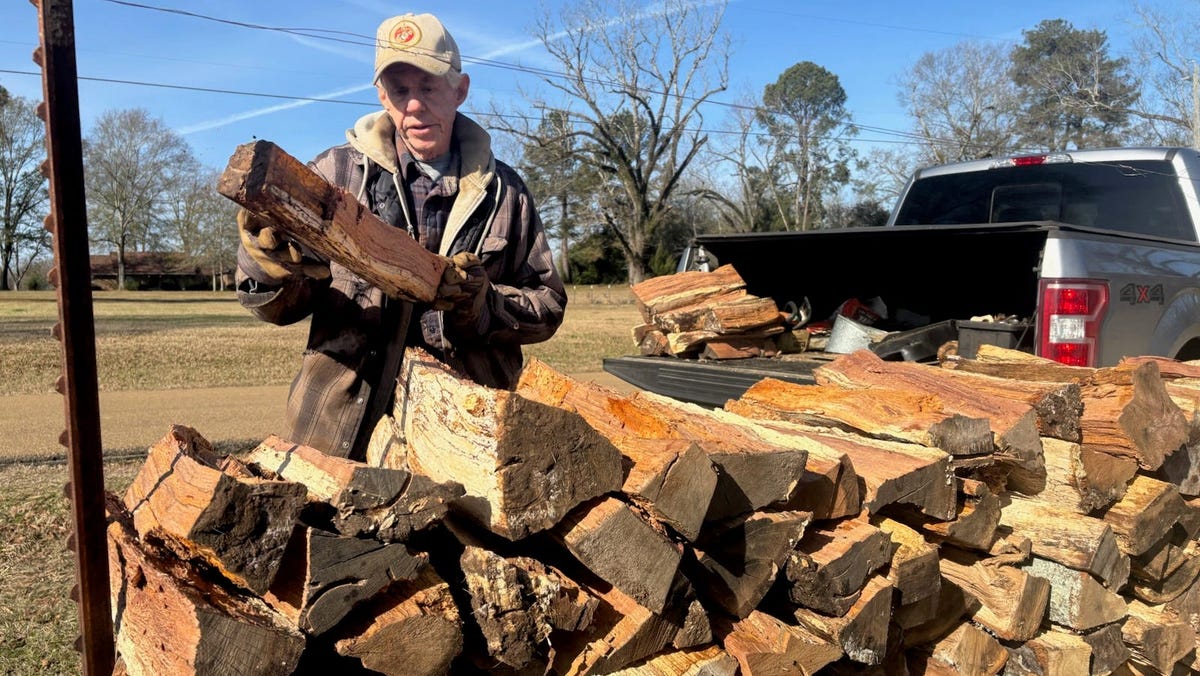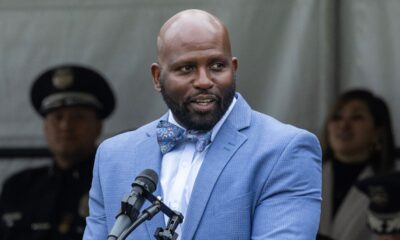Health
It’s Never Too Late to Become a Nurse

“It’s Never Too Late” is a series that tells the stories of people who decide to pursue their dreams on their own terms.
Joanna Patchett has always had a fear of death, and the dying.
“I was terrified of being responsible for people’s lives, and was frightened of the space between life and death,” she said.
And yet in July 2020, as coronavirus cases filled up hospitals, Ms. Patchett, who was fresh out of nursing school, found herself caring for extremely ill Covid patients in the intensive care unit at Binghamton General Hospital in upstate New York.
“Seeing how sick everyone was — was heartbreaking. It was a life-changing and extremely difficult experience,” said Ms. Patchett, a 39-year-old Binghamton resident. “I didn’t expect to see so many people dying in quick succession, or to be on a floor full of ventilated patients, or intubating people so frequently, or being their primary person to have contact with them when the rest of the world could not.”
Ms. Patchett had dreamed of becoming an actress, but didn’t have much luck at the profession. In 2019, when she was 35, she went back to school, having been accepted into a one-year accelerated nursing program. Most of her classmates came to nursing straight out of college, and many fondly called her Mom. As the pandemic worsened, she was deeply moved by “how people would open up and be so vulnerable with us.”
“You could see the humanity, how worthy everyone is of life, and how hard the body fights to live,” she said.
Ms. Patchett never imagined her life would turn out this way. After getting a bachelor’s degree in English and drama from Ithaca College, she spent a decade feeling “lost and depressed,” bouncing from one job to another — teaching English and yoga, working in a dental office. She felt behind in life because she didn’t know what she wanted to do. “I knew I had something to give, but didn’t know what that was,” she said.
“I was jealous of people who challenged themselves,” Ms. Patchett said. “I never had. If I was going to grow and find myself, I needed to try something scary. I had to take a risk and challenge myself.”
It was her mother who cajoled her into nursing, sensing she’d be good in the field, even though Ms. Patchett disagreed. “I didn’t think I was equipped for that experience, or that I could handle it spiritually and emotionally.”
But over the past several years, that’s exactly where she found herself, despite the 12-hour shifts, the daily emergencies and the often harrowing emotional work. For Ms. Patchett, who lives alone, it was especially difficult to return to an empty apartment. Though her family lived only five miles away, she couldn’t see her relatives often because of the high risk of contracting the coronavirus, and there was nothing alive and vibrant to come home to. Many nights she returned from work and cried. As the intense stress of being an I.C.U. nurse took a mental toll on her, she adopted a cat, Tanky. “I wanted something to love,” she said. “Tanky really helped me through Covid. He is 15 pounds of furball love and emotional healing.”
“To lose patients I’d become close to and have them die in such a devastating way made me question everything,” she said. “But I began to see this work as my duty. It was a war. I wasn’t going to let them die alone.”
The following interview has been edited and condensed.
Since, on your first nursing job, you unexpectedly found yourself assigned to the I.C.U. floor and caring for Covid patients, did you ever regret your decision to become a nurse?
No. I never regretted this work or being here, even though it was terrifying. If anything, I found my calling. I wasn’t afraid to be the person watching someone die, or being with them when they were. I was good at being present as they passed, and I could work under a tremendous amount of stress.
How did you find the strength to face your fears?
I didn’t have a choice. You can’t run away from this kind of work. I found my ability to be challenged and then I found the strength to stay. I didn’t have the luxury of leaving sick people, nor did I want to. Someone had to be there. I knew it had to be me.
Once you were accepted into a nursing program, you realized you were one of the oldest people attending. What was that like?
I felt out of place. Most everyone was 20, 25-year-olds, pursuing nursing shortly after getting their first degree. They were bubbly. I didn’t feel part of that excited buzz. But Gen Z is a welcoming group. They didn’t have the judgment that was inside of me. Once we broke into clinical groups, we became very tight and depended on each other. We shared a lot of intense moments that gave me strength because we supported one another.
How did it feel to have the younger students call you Mom?
It was endearing. I watched out for them and made sure everybody was OK. I would bring food in case somebody hadn’t eaten. I became the person they turned to if they were going through a hard moment. I had experience from being older, something no one else had. And they made me feel I mattered; that made me feel special. I learned from them, too.
What has being a nurse taught you?
I’ve never had a job that was so meaningful or made me feel I was serving a purpose. Facing death helped me realize you can’t give up. Through nursing, I’ve learned life is going to be incredibly hard, and it’s going to hurt, but you have to make the choice to keep fighting — that’s part of living. I learned I matter, and I matter to people who are dying and who want me by their side as they are doing it.
After 18 months of fighting to save Covid patients, you decided to switch to palliative care. Why?
I burned out. I realized I had to move to another part of nursing. On the I.C.U. floor, I’d received a tutelage in death. I wanted to help people control their death, rather than watch people die flailing and gasping. When we seemed out of the woods for Covid, I started helping the elderly and those with terminal illnesses decide how they wanted to die. I’m now a hospice nurse case manager at Lourdes Hospice, an outpatient home end-of-life care provider, in Vestal, N.Y., where I interact with 20 to 30 families a week. And I’m part of deeper discussions that deal with the dignity of dying.
What have you learned about yourself as you’ve learned to care for others?
I have a voice that carries wisdom. I have a special ability to listen and to see people while being present with them in those very hard moments.
What’s the best piece of advice you can offer?
When it comes to changing your life, you sometimes have to decide to change. Once you do, almost anything is possible. Everything you do contributes to who you are now. Ironically, my yoga, acting and teaching training gave me the ability to stay grounded, present and in the moment. Not one part of your journey, even if you’re not sure what you’re doing, or where it’s going to lead you, is ever wasted. You’re never late; you’ve simply not arrived yet.

Health
Semaglutide Pills and Injections Vs. Drops: Experts Weigh In | Woman's World

Sign Up
Create a free account to access exclusive content, play games, solve puzzles, test your pop-culture knowledge and receive special offers.
Already have an account? Login
Use left and right arrow keys to navigate between menu items.
Use escape to exit the menu.
Health
Jennifer Hudson Lost 80-Lbs Without Depriving Herself—Learn Her Secrets

Sign Up
Create a free account to access exclusive content, play games, solve puzzles, test your pop-culture knowledge and receive special offers.
Already have an account? Login
Use left and right arrow keys to navigate between menu items.
Use escape to exit the menu.
Health
Kennedy’s Plan for the Drug Crisis: A Network of ‘Healing Farms’

Though Mr. Kennedy’s embrace of recovery farms may be novel, the concept stretches back almost a century. In 1935, the government opened the United States Narcotic Farm in Lexington, Ky., to research and treat addiction. Over the years, residents included Chet Baker and William S. Burroughs (who portrayed the institution in his novel, “Junkie: Confessions of an Unredeemed Drug Addict”). The program had high relapse rates and was tainted by drug experiments on human subjects. By 1975, as local treatment centers began to proliferate around the country, the program closed.
In America, therapeutic communities for addiction treatment became popular in the 1960s and ’70s. Some, like Synanon, became notorious for cultlike, abusive environments. There are now perhaps 3,000 worldwide, researchers estimate, including one that Mr. Kennedy has also praised — San Patrignano, an Italian program whose centerpiece is a highly regarded bakery, staffed by residents.
“If we do go down the road of large government-funded therapeutic communities, I’d want to see some oversight to ensure they live up to modern standards,” said Dr. Sabet, who is now president of the Foundation for Drug Policy Solutions. “We should get rid of the false dichotomy, too, between these approaches and medications, since we know they can work together for some people.”
Should Mr. Kennedy be confirmed, his authority to establish healing farms would be uncertain. Building federal treatment farms in “depressed rural areas,” as he said in his documentary, presumably on public land, would hit political and legal roadblocks. Fully legalizing and taxing cannabis to pay for the farms would require congressional action.
In the concluding moments of the documentary, Mr. Kennedy invoked Carl Jung, the Swiss psychiatrist whose views on spirituality influenced Alcoholics Anonymous. Dr. Jung, he said, felt that “people who believed in God got better faster and that their recovery was more durable and enduring than people who didn’t.”
-
/cdn.vox-cdn.com/uploads/chorus_asset/file/25822586/STK169_ZUCKERBERG_MAGA_STKS491_CVIRGINIA_A.jpg)
/cdn.vox-cdn.com/uploads/chorus_asset/file/25822586/STK169_ZUCKERBERG_MAGA_STKS491_CVIRGINIA_A.jpg) Technology1 week ago
Technology1 week agoMeta is highlighting a splintering global approach to online speech
-

 Science1 week ago
Science1 week agoMetro will offer free rides in L.A. through Sunday due to fires
-
/cdn.vox-cdn.com/uploads/chorus_asset/file/23935558/acastro_STK103__01.jpg)
/cdn.vox-cdn.com/uploads/chorus_asset/file/23935558/acastro_STK103__01.jpg) Technology1 week ago
Technology1 week agoAmazon Prime will shut down its clothing try-on program
-

 News1 week ago
News1 week agoMapping the Damage From the Palisades Fire
-
/cdn.vox-cdn.com/uploads/chorus_asset/file/25826211/lorealcellbioprint.jpg)
/cdn.vox-cdn.com/uploads/chorus_asset/file/25826211/lorealcellbioprint.jpg) Technology7 days ago
Technology7 days agoL’Oréal’s new skincare gadget told me I should try retinol
-
/cdn.vox-cdn.com/uploads/chorus_asset/file/25832751/2192581677.jpg)
/cdn.vox-cdn.com/uploads/chorus_asset/file/25832751/2192581677.jpg) Technology4 days ago
Technology4 days agoSuper Bowl LIX will stream for free on Tubi
-

 Business5 days ago
Business5 days agoWhy TikTok Users Are Downloading ‘Red Note,’ the Chinese App
-
/cdn.vox-cdn.com/uploads/chorus_asset/file/25835602/Switch_DonkeyKongCountryReturnsHD_scrn_19.png)
/cdn.vox-cdn.com/uploads/chorus_asset/file/25835602/Switch_DonkeyKongCountryReturnsHD_scrn_19.png) Technology2 days ago
Technology2 days agoNintendo omits original Donkey Kong Country Returns team from the remaster’s credits















